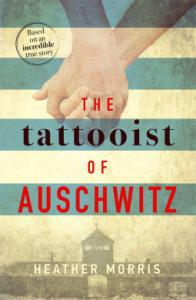
What’s it all about?:
The Tattooist of Auschwitz is based on the true story of Lale and Gita Sokolov, two Slovakian Jews who survived Auschwitz and eventually made their home in Australia. In that terrible place, Lale was given the job of tattooing the prisoners marked for survival – literally scratching numbers into his fellow victims’ arms in indelible ink to create what would become one of the most potent symbols of the Holocaust. Lale used the infinitesimal freedom of movement that this position awarded him to exchange jewels and money taken from murdered Jews for food to keep others alive. If he had been caught, he would have been killed; many owed him their survival.
There have been many books about the Holocaust – and there will be many more. What makes this one so memorable is Lale Sokolov’s incredible zest for life. He understood exactly what was in store for him and his fellow prisoners, and he was determined to survive – not just to survive but to leave the camp with his dignity and integrity intact, to live his life to the full. Terrible though this story is, it is also a story of hope and of courage. It is also – almost unbelievably – a love story. Waiting in line to be tattooed, terrified and shaking, was a young girl. For Lale – a dandy, a jack-the-lad, a bit of a chancer – it was love at first sight, and he determined not only to survive himself but to ensure that Gita did, too. His story – their story – will make you weep, but you will also find it uplifting. It shows the very best of humanity in the very worst of circumstances.
Like many survivors, Lale and Gita told few people their story after the war. They eventually made their way to Australia, where they raised a son and had a successful life. But when Gita died, Lale felt he could no longer carry the burden of their past alone. He chose to tell his story.
What did WE think?:
CHRISSI: This book has sensitive content. We’ve both read books about WWII before. How does this book compare to others in its genre?
BETH: I think any book about World War II and the atrocities of The Holocaust is always going to be difficult to read but it’s actually one of my preferred periods of history to read about. I like hard-hitting topics that make me think and appreciate my own life a bit better and generally, whenever I read a book in this genre, I find out something brand new every single time. I thought it was a fascinating story that was all the more poignant for being based on real-life individuals. It was all the more unique for being told from the perspective of a character who was forced to tattoo those terrible numbers on the prisoners in Auschwitz. If I compared it to other books based around the same period like The Boy In The Striped Pyjamas by John Boyne, I don’t think I enjoyed it quite as much as the Boyne but it’s still an excellent read in the genre.
BETH: Had Gita and Lale met in a more conventional way, would they have developed the same kind of relationship? How did their circumstances change the course of their romance?
CHRISSI: Hmm. A really interesting question there. I’m not so sure they would have developed such an intense relationship. I feel that the environment they were in pushed them together and made them feel deeper than they may have done if they had met in a conventional way. They pretty much felt a connection instantly and didn’t really have outside influences that could change the course of their relationship.
CHRISSI: Did this book make more of an impact on you because it was based on a true story from that time?
BETH: For sure. I hadn’t realised when I first read the synopsis that it was based on people that actually existed and when you realize this as a reader, it automatically makes the novel even more moving and impactful. However, I think I was touched most by the extra parts of the novel i.e. the afterwords written by the author after the story ends. In particular, she talks about how she met Lale and what his drive was for getting this story published. To meet the man behind the character was a touch of brilliance and very emotional to read.
BETH: In what ways was Lale a hero? In what ways was he an ordinary man?
CHRISSI: I personally think that any person that experienced the Holocaust is a pretty heroic individual to me. I think Lale’s story is impressive because he tried to help those in need even though he was in a high place compared to others in the camp. I do think that Lale was quite selfless and wanted to improve lives of others that were struggling, despite the fact that it could get him into trouble. As for being an ordinary man? I think he had inner strength like many of us do, it’s just hidden sometimes.
CHRISSI: How did you feel about Lale when he was first introduced, as he arrived in Auschwitz? How did your understanding of him change throughout the novel?
BETH: This sounds terrible to say but I didn’t really like Lale when he was first introduced in the novel. He seemed quite cocksure and I didn’t particularly gel with his attitude towards women. He didn’t have a bad attitude, I hasten to add. In fact, he loved all women unreservedly. However, it was the way in which he was keen to share this with the reader that I didn’t really buy into. As he progresses through the novel, we see how much he suffers, watch him falling in love (even though it was pretty instantaneous and I wasn’t too sure about this part) but it’s his selflessness and determination to make life better for all other prisoners that I really ending up admiring and respecting about his character in the end.
BETH: How does this novel change your perceptions about the Holocaust in particular, and war in general? What implications does this book hold for our own time?
CHRISSI: I’m not so sure that it’s changed my perceptions of the Holocaust. I still think it was an awful, awful time (even though I do like to read about it!) What I did like about this book was that it gave a different, more hopeful approach. The fact that Lale went above and beyond for those suffering really made my heart happy. I love acts of kindness. I certainly think we could all learn from those acts of kindness that were carried out in recent times.
CHRISSI: Discuss some of the small acts of humanity carried out by individuals in The Tattooist of Auschwitz. How did these small acts of kindness have greater implications?
BETH: I don’t think any of us in the present time can ever imagine what it was like to be in a Nazi concentration camp and how difficult and brutal the conditions were for the prisoners. One of the things I enjoyed most about this novel was the risk certain individuals took, especially considering that they could have lost their own lives in the process just to make another person more comfortable or safe. The viciousness of the German guards never fails to shock and appal me but it’s through these tiny acts of kindness that you start to see hope for the human race in the future. It’s amazing how such tiny things can make a world of difference to someone suffering and it was truly heart-warming.
BETH: Would you read another book by this author?
CHRISSI: I think so. I did enjoy the author’s writing style and I tore through it!
Would WE recommend it?:
BETH: But of course!
CHRISSI: Of course!
BETH’s Star rating (out of 5):

CHRISSI’s Star rating (out of 5):


